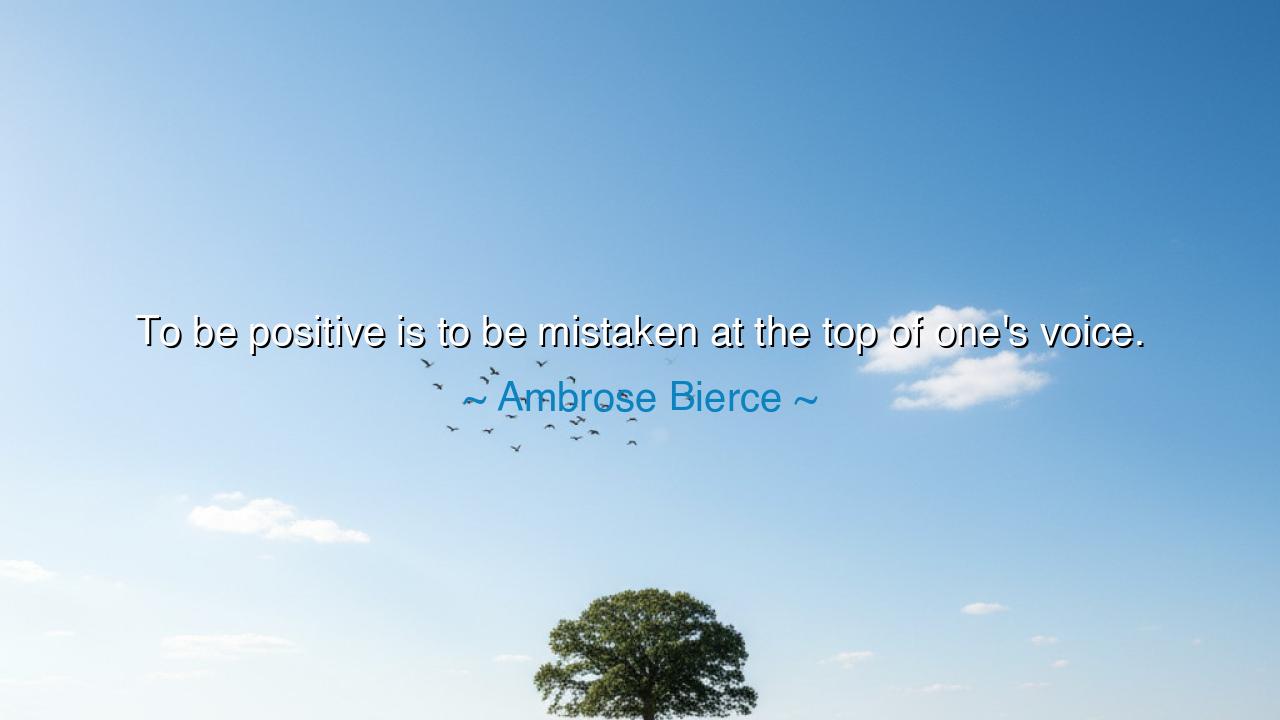
To be positive is to be mistaken at the top of one's voice.






Hear the sharp and ironic words of Ambrose Bierce, master of dark wit and author of The Devil’s Dictionary: “To be positive is to be mistaken at the top of one’s voice.” This is no gentle encouragement to optimism, but a sword of satire aimed at human arrogance. For Bierce saw in his age—and in every age—that men and women often cloak ignorance with certainty, and that the loudest voices are not always the wisest. His words are both a warning and a mirror, forcing us to confront the danger of mistaking confidence for truth.
The meaning of his saying lies in the difference between humility and pride. To be positive in the sense he mocks is not to be hopeful or encouraging, but to claim absolute knowledge where none exists. It is to cry out with great conviction, yet to be utterly mistaken. This, Bierce suggests, is the condition of many in the world: more concerned with volume than with wisdom, more eager to proclaim than to listen. The danger is not in being wrong—this is the fate of all mortals—but in being wrong while insisting with thunderous certainty that one is right.
The ancients too knew this truth. Socrates, who was hailed as the wisest of men, declared that his wisdom lay in knowing that he knew nothing. In contrast, the Sophists, filled with pride, shouted their doctrines across Athens, claiming mastery of truth while chasing shadows. When tested, their positive declarations crumbled into dust. In the end, it was the humble questioner who endured, while the loud and mistaken voices were silenced by time.
History is filled with examples of Bierce’s warning. Think of the doctors in centuries past who declared with absolute certainty that bleeding and leeches were the cure for nearly every illness. Their positive conviction was so strong that dissent was mocked. Yet they were terribly mistaken, and countless lives were lost because their false confidence was louder than truth. Here we see the peril of knowledge proclaimed without question, conviction untempered by humility.
Bierce’s quote also points to a universal flaw in human nature: our desire to appear strong and sure. To admit uncertainty feels weak, and so many choose to speak with the force of authority, even when their footing is unsteady. But wisdom lies not in the appearance of strength, but in the willingness to be silent, to question, to learn. To avoid becoming the “mistaken at the top of one’s voice” is to embrace the discipline of doubt and the courage of humility.
The lesson for us, then, is clear: let our voices not outpace our knowledge. Speak with conviction when truth is sure, but when the ground is uncertain, speak with caution. Do not confuse loudness for strength or certainty for wisdom. Remember that the wise build slowly, while the foolish rush forward with noise. Silence, reflection, and inquiry often carry more power than the greatest shout.
Practical actions follow from this wisdom. Before making bold claims, test them against evidence, and seek counsel from those wiser than yourself. When you feel tempted to speak loudly, pause and ask: Do I know this to be true, or am I merely clinging to pride? Encourage those around you to value questions as much as answers, humility as much as boldness. By cultivating this spirit, you will avoid the folly Bierce condemns, and your words, when spoken, will carry true weight.
So remember Bierce’s warning: “To be positive is to be mistaken at the top of one’s voice.” Do not let your confidence outrun your wisdom. Speak less, listen more, and when you must speak, let your words flow from truth, not vanity. For in the end, the quiet voice of the humble seeker will echo longer than the booming shout of the mistaken.






KVLe Thu Khanh Van
This statement invites reflection on communication styles. Does the volume or forcefulness of one’s opinion influence its perceived truth, and how does that affect social dynamics? I’m curious about the psychological mechanisms that make confident statements more persuasive than hesitant ones, even when wrong. How can we encourage careful reasoning and evidence-based discussion in contexts where loud voices often dominate the conversation?
TADang Thu An
I feel amused but also wary of this insight. It seems to suggest that certainty can be dangerous when unexamined. How do we teach critical thinking and skepticism without discouraging assertiveness? Could embracing uncertainty and the willingness to revise one’s views be the antidote to this kind of confident error? I’d like to explore examples where initial certainty led to mistakes, and how those situations could have been mitigated.
PVNguyen Phuong Vy
This makes me question whether society encourages this behavior. Do people who assert themselves loudly gain more attention or authority, even if they’re wrong? I wonder how this dynamic affects leadership, decision-making, and debate. Are there mechanisms to counteract the influence of confident but incorrect voices, or do we naturally gravitate toward those who speak with conviction regardless of accuracy?
UGUser Google
Reading this, I feel challenged to consider how positivity and certainty are perceived differently. Could someone genuinely optimistic be at risk of overestimating outcomes and making errors? I’m curious whether Bierce’s statement is more a critique of blind certainty than of optimism itself. How can we balance being hopeful or positive with critical thinking and realistic assessment to avoid speaking ‘at the top of one’s voice’ while mistaken?
P8Chau Phi 8
I find this perspective a bit cynical, yet it raises an interesting question about human nature. Is it natural for people to assert their opinions loudly, even when mistaken, as a way to convince themselves and others? Could this tendency explain why misinformation spreads so easily? I’d like to discuss strategies for recognizing when confidence is misleading and how to cultivate humility without undermining assertiveness.